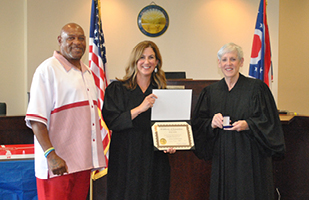
Veteran graduate Andy Smith celebrates his completion of treatment court with Judge Marisa Cornachio and Chief Justice Maureen O'Connor.
Two years of hard work by a judge, a court, and its community was rewarded on Thursday. Lake County’s first veterans treatment court graduated its first group of former service members.
“This is truly a special day,” said Willoughby Municipal Judge Cornachio, who created the treatment-based probation program known as a specialized docket.
The 29th veterans treatment program certified by the Supreme Court of Ohio was developed to address a gap in the county’s judicial system devoted to justice-involved veterans, some of whom struggle with mental health and substance use issues. According to the U.S. Census Bureau, Lake County is home to more than 14,000 veterans. Ohio ranks sixth nationally with 850,000 veterans.
“We have felt from the very beginning that it is an honor to help our veterans get their lives back on track after they have sacrificed so much for the country we love,” said Judge Cornachio.
“Studies have shown that rehabilitation based on treatment reduces recidivism and saves tax dollars.” — Chief Justice O'Connor
Joining the judge for the momentous occasion as keynote speaker was Chief Justice Maureen O’Connor. A longtime champion of specialized dockets, the chief justice has seen the number of support and recovery court programs grow to 262 since the Supreme Court started a certification process focused on evidence-based best practices in 2009. The premise of a specialized docket is to hold offenders accountable for their actions while addressing underlying causes of behavior, such as substance use, mental illness, and struggles with everyday needs, such as food, housing, and employment. Courts work with community partners – treatment facilities and social service organizations – to customize recovery plans based on participants’ needs.
“We must use what we learn to solve problems in different ways and to heal where we can,” said Chief Justice O’Connor. “Studies have shown that rehabilitation based on treatment reduces recidivism and saves tax dollars.”
Individual and program success is often attributed to the mentors in the programs who understand the probationer based on similar experiences. At Willoughby Municipal Court, guidance comes from veterans who have firsthand knowledge about the challenges of active duty and reintegrating into society after service. The responsibility to serve others stays with veterans beyond their military years, it is part of their culture. The “model” of a mentor for someone seeking sobriety works because of the special relationship built on similar life experiences and challenges.
“We will continue and expand the way we honor veterans who want a healthier re-entry to life in Ohio communities,” she said.
• • •• • •













